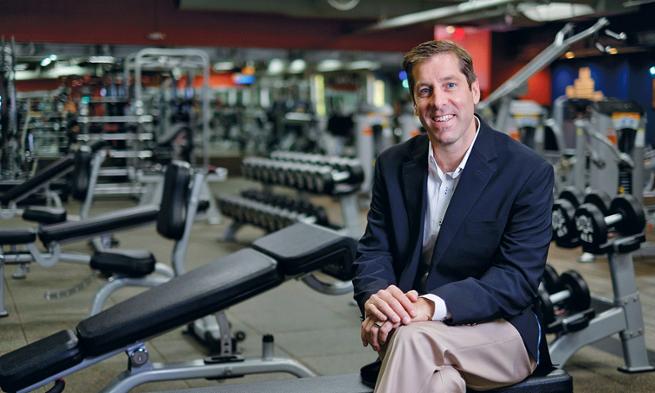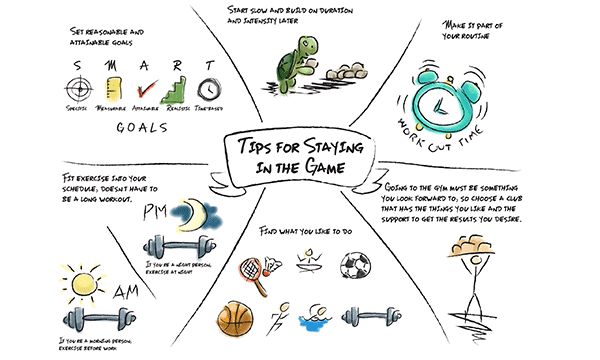Fit for success
Health and Behavior
Fitness mogul John Galiani ('90) shares tips on maintaining a healthy lifestyle
By Kyle Kearns ('15)
After fighting doubts about his original university, John Galiani ('90) decided to follow in his sister’s footsteps. She had transferred to James Madison University after feeling uncertain about her own school and found the academic home she’d been looking for. John felt the same way. “JMU is an amazing place,” says Galiani, “the people there are just special.”
In order to maintain his competitive, athletic lifestyle, Galiani balanced rigorous finance classes with weekend rugby matches. He gained valuable experience from those years on the pitch at JMU. “We were really a ragtag group of people from a wide variety of backgrounds and future goals,” says Galiani, “it taught me how much can be accomplished by a diverse group of talented people with a common goal, and the willingness to work hard to accomplish it.”
Galiani says his time spent at JMU was “a collection of experiences both in the classroom and out of the classroom that prepared [me] for the next stage in life.” Little did he know at the time, the next stage in his life would be a massively successful partnership in the health club industry with his brother Kirk.
In the early '90s, the lease on Kirk’s current gym was about to expire, so he set out to find the owner a new location for the club's operation. When Kirk couldn’t convince the owner to go for the new place, he called his brother John. Together, they managed and operated the establishment on their own, creating a full-service gym complete with aerobics and cardiovascular equipment. It was the duo’s first of many successful gyms. Today, John and Kirk operate US Fitness Holdings, one of the top ten largest health club operators in the country.
“I never had any great plans to build a big business,” says Galiani, “I went into the fitness business because it was something I always enjoyed. I was happy to work with my brother, and I had passion to help improve lives through fitness.”
The brothers point to passion, humility and honesty for their success in the health club industry. “If you deliver a superior experience, the money will come,” Galiani says. “To be a successful, I believe you should focus on how to deliver a superior service or product to your customer, not on how to make more money.”
"There are numerous studies that show a significant return on investment for money spent by employers on employee fitness participation. The benefits include higher employee productivity, fewer sick days, lower medical claims, and the ability to attract and retain better employees.”
The Galiani brothers opened a number of Gold’s Gym franchises throughout the Washington, D.C., area before partnering with a private equity firm to purchase Gold’s Gym International in 1999. John and his brother Kirk would serve as COO and CEO, respectively. They immediately sought to extend the brand—to turn Gold’s Gym into something bigger, not just a place to lift weights. The two added a reliable revenue stream by building a robust product licensing division, as well as opening company-owned stores. Between memberships and officially licensed products, like gym equipment and apparel, John and Kirk grew Gold’s Gym International into a massive success.
Five years after the Galiani brothers purchased and developed Gold’s Gym, they sold the company to start their own health club, Onelife Fitness—a successful chain of fitness clubs that maintains 10 locations throughout Virginia, with an additional club in Missouri. When they sold Gold’s Gym, the brand had over 650 clubs in more than 20 different countries.
Onelife Fitness partnered with New Evolution Ventures in 2011 to create US Fitness. This company recently made headlines for acquiring Sport & Health, an extensive health club operating out of Washington, D.C., as well as Atlanta Fitness, operating out of the Southeast. In its entirety, the US Fitness now features a portfolio with over 40 clubs.
“Our [current health care] system is burdened by well over $100 billion annually in excess costs due to inactivity and obesity. Why we don’t incentivize preventive health care baffles me. Currently, our system is really sick care. You get sick, then you get care.”
“No one would think it’s OK to not change the oil in your car and wait for a problem, then change the engine.”

When asked about employers offering fitness plans as benefits for their employees, Galiani replied, “absolutely. There are numerous studies that show a significant return on investment for money spent by employers on employee fitness participation. The benefits include higher employee productivity, fewer sick days, lower medical claims, and the ability to attract and retain better employees.”
